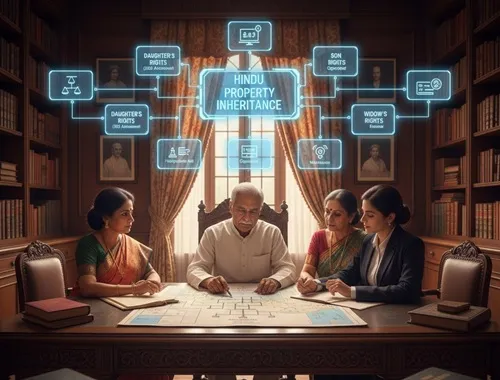Hindu Property Inheritance: Rights of Daughters, Sons & Widows

The Hindu Succession Act, 1956 governs how property is inherited among Hindus, Buddhists, Jains, and Sikhs in India. It covers both male and female inheritance, ensuring fair distribution after a person's death — especially after the 2005 amendment, which made daughters equal to sons in ancestral property.
Key Highlights
- Applies to Hindus, Buddhists, Jains, and Sikhs.
- Divides legal heirs into Class I (close family) and Class II (extended family).
- Daughters and sons have equal rights in ancestral property (after 2005).
- Married daughters have the same rights as unmarried ones.
- Widow, mother, and children inherit equally if a man dies without a will.
- If there are no legal heirs, property goes to the government.
- Recognises women's right to own and transfer property independently.
State-Wise Notes
| State/UT | Special Provision/Note |
|---|---|
| Maharashtra | Adopted the 2005 amendment early; strong enforcement of daughters' rights. |
| Tamil Nadu | Granted equal coparcenary rights to daughters even before 2005 (since 1989). |
| Kerala | Abolished the joint family system (HUF) through the Kerala Joint Family System (Abolition) Act, 1975. |
| Karnataka | Follows central amendment; daughters' rights fully recognised. |
| Delhi, UP, MP, Rajasthan | Follow the central Hindu Succession (Amendment) Act, 2005 uniformly. |
Quick Example
If a Hindu man dies without a will, leaving behind a wife, one son, and one daughter —
→ Each gets a 1/3 share of the property.
If the daughter is married, she still gets an equal share.
FAQs – Hindu Property Inheritance
-
1. Who does this law apply to?
-
Hindus, Buddhists, Jains, and Sikhs.
-
2. Does it apply to Muslims or Christians?
-
No. They follow their own personal laws.
-
3. What happens if a Hindu dies without a will?
-
Property is distributed among legal heirs as per this Act — spouse, children, and mother first.
-
4. Are sons and daughters treated equally?
-
Yes. After the 2005 amendment, both have equal rights in ancestral property.
-
5. Can a married daughter claim her share in her father's property?
-
Yes. Marriage does not affect her inheritance rights.
-
6. What are Class I heirs?
-
Immediate family — sons, daughters, widow, and mother.
-
7. Who inherits if there are no Class I heirs?
-
Then property goes to Class II heirs — father, brother, sister, etc.
-
8. Does a widow lose her rights if she remarries?
-
No. A widow retains her right to inherit property.
-
9. Can a Hindu woman own and transfer property?
-
Yes. Women can own, inherit, and will property just like men.
-
10. What if a child dies before the parent?
-
The child's heirs (like their children) get that share.
-
11. Can an adopted child inherit property?
-
Yes. Adopted children have equal inheritance rights as biological ones.
-
12. Does this law apply if there's a valid will?
-
No. A registered will overrides this Act.
-
13. Can grandchildren inherit property?
-
Yes, if their parent (the deceased's child) is no longer alive.
-
14. Can a person be disqualified from inheriting?
-
Yes, for example, if they murder the deceased or renounce Hinduism (depending on circumstances).
-
15. Do daughters have rights in ancestral land and HUF property?
-
Yes. Daughters are now coparceners, just like sons, and can demand partition.
-
16. Can a mother claim a share in her son's property?
-
Yes. The mother is a Class I heir and inherits equally.
-
17. What happens if someone dies with no relatives?
-
The property goes to the government (escheat).
-
18. Can a daughter become the head (Karta) of a Hindu Undivided Family (HUF)?
-
Yes. After 2005, daughters can be Karta of an HUF.
-
19. Can siblings claim property after many years?
-
Yes, but it's better to act within the limitation period (12 years for partition suits).
-
20. Can a family settle property shares without going to court?
-
Yes. They can do it via a registered family settlement deed to avoid disputes.
Add new comment